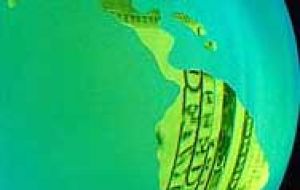MercoPress. South Atlantic News Agency
Bad news for Latin America

With Europe and America struggling to address the ongoing global economic crisis, the forces of economic nationalism are on the march. Industry representatives and trade unions are busy lobbying the halls of power in Washington, Brussels, Paris, and London. They are seeking subsidies, tariff protection from foreign competition, restrictions on foreign labor, and even measures that pressure Europeans and Americans into buying domestically-made products.
The stimulus package recently cobbled together by the American Congress, for example, contains “Buy American” provisions. These actively discriminate against foreign imports. Likewise, an economic assistance package recently offered by the French government to domestic car companies is contingent upon these businesses not closing any plants based inside France. This means that some plants owned by these companies outside France will be closed - no matter how much more efficient they may be than French-based factories.
Those who immediately stand to lose the most from this wave of protectionism, however, are not Europeans and Americans. Among the biggest losers will be Latin American nations. This is especially true when it comes to the shift toward financial protectionism now underway in Europe and America.
As recently observed by The Economist, many American and European banks recently rescued by their governments have been told they are expected to focus their lending on domestic markets. One Dutch bank, ING, recently promised that, as a result of receiving another injection of capital from the Dutch government, it would lend another 32 billion US dollars to Dutch companies.
At a time when credit around the world is frozen and the amount of available capital dramatically diminished, this means that countries outside America and Europe can expect diminishing foreign capital inflows. The International Monetary Fund is predicting that private capital flows to emerging markets in 2009 will be almost 82% lower than it was in 2007. This is very bad news for developing nations.
It is especially damaging for Latin America. In a recent speech in Washington, the World Bank’s Vice President for Latin America and the Caribbean observed that Latin America began experiencing a dramatic fall in inward capital flows after the collapse of Lehmann Brothers in September 2008. When accompanied by the collapse of commodity prices, this spells trouble for the region.
As the distinguished Financial Times journalist, Martin Wolf, comments in his recent book Fixing Global Finance (Johns Hopkins University Press, 2008), the domestic banking sectors of many emerging economies like those of Latin America are simply too small to support local industries by themselves.
In short, Latin American countries are far more dependent on foreign capital than most other regions of the world. They thus have much more to lose from the spread of financial nationalism in Europe and America.
So what should Latin America governments and policymakers do? For one thing, they should insist that governments in Europe and America adhere to existing free trade agreements. Second, they should underline each and every instance of creeping economic nationalism and protest against such measures in the strongest terms possible. They should also remind their counterparts in America and Europe that the decline in economic growth associated with weakening foreign capital inflows will most adversely impact those Latin Americans most in need of jobs and incomes – the poor.
But perhaps most importantly, Latin American leaders need to make Europeans and Americans understand that the liberty to trade goods and services – including capital – across national boundaries is not a privilege. Free trade is a right. The first to make this argument was the sixteenth-century theologian Francisco de Vitoria in De Indis et de Ivre Belli Relectiones (1532). Here Vitoria stated that that the right to free trade is derived from the natural right of free association enjoyed by all people.
Significantly, Vitoria made this argument in the context of insisting that the peoples of Latin America should not be prevented from freely trading with European merchants by either the indigenous rulers or the Spanish king. Vitoria even went so far as to describe laws inhibiting free trade between nations as “iniquitous and against charity”.
In the end, everyone loses when protectionism becomes the norm. It breeds complacency and inefficiency among the “protected.” It also starves those locked out of global markets of access to economic opportunity and much-needed foreign capital. Worst of all, economic nationalism is fundamentally unjust and discourages us from recognizing that everyone is our neighbor – whatever their nationality.
By Samuel Gregg D.Phil.
Dr. Samuel Gregg has written and spoken extensively on questions of political economy, economic history, ethics in finance, and natural law theory. He has an MA in political philosophy from the University of Melbourne, and a Doctor of Philosophy degree in moral philosophy from the University of Oxford, which he attended as a Commonwealth Scholar and worked under the supervision of Professor John Finnis.




Top Comments
Disclaimer & comment rulesCommenting for this story is now closed.
If you have a Facebook account, become a fan and comment on our Facebook Page!